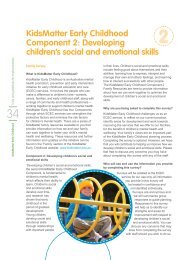Reflections, Gowrie Australia, Spring 2013 - Issue 52 - KidsMatter
Reflections, Gowrie Australia, Spring 2013 - Issue 52 - KidsMatter
Reflections, Gowrie Australia, Spring 2013 - Issue 52 - KidsMatter
- No tags were found...
You also want an ePaper? Increase the reach of your titles
YUMPU automatically turns print PDFs into web optimized ePapers that Google loves.
SOCIAL AND EMOTIONAL LEARNING:A foundation for early childhood mental healthAuthor:Dr. Vidanka VasilevskiProject Officer<strong>KidsMatter</strong> Early Childhood<strong>Australia</strong>n Psychological SocietyEarly childhood is our best opportunityto build mental health and providechildren with the social and emotionalfoundations to grow into capable andhappy adults. <strong>KidsMatter</strong> EarlyChildhood is partnering with EarlyChildhood Education and Care (ECEC)services around the country to achievebetter mental health and wellbeing forchildren, through promotion, prevention,and early intervention. By providingthese services with ProfessionalLearning sessions and resources,<strong>KidsMatter</strong> targets social and emotionallearning and development, which is socrucial for children's current and futuremental health. By focusing on theseaspects, the <strong>KidsMatter</strong> Frameworkalso supports the achievement of theEarly Years Learning Framework'sLearning Outcomes.Early childhood mental health has been described as the“capacity of a young child – within the context of theirdevelopment, family, environment and culture – to:• participate in the physical and social environment;• form healthy and secure relationships;• experience, regulate, understand and express emotions;• understand and regulate their behaviour;• interact appropriately with others, including peers; and• develop a secure sense of self” (HIMHCS & HISC, 2012:13).This definition reflects the significance of healthy social andemotional learning and development in the early years. AsECEC services see many children for extended periods oftime, they are well placed to support children’s social andemotional development.Meeting children - for who they are and wherethey come fromChildren come from a range of contexts and they alldevelop at different rates and stages. <strong>KidsMatter</strong> asks ECECservices to reflect on the children who are a part of theircommunities. Do they know them well? Knowing childrenwell is the basis of supporting children’s social and emotionaldevelopment. When we know who children are, whatthey’re like, where they come from, and what their family islike, we are more equipped to relate to them in a way thatsuits their style of social and emotional learning.18
The significance of relationshipsChildren are born with the capacity to form relationships.It is through their relationships that children learn aboutwho they are, how to interact with others, and how tomanage their emotions (Stonehouse, 2012). By getting toknow children and their families well, educators supportthis ability to develop and form relationships. <strong>KidsMatter</strong>focuses on the role of relationships between children andeducators. These relationships provide a model for howchildren should treat and expect to be treated by others.They also instil a sense of safety and security, allowingthem to explore and interact with their world. Theexperience of supportive relationships assists children intheir ongoing relationship formation and in developingpositive mental health.Being confident to exploreWarm, responsive and trusting relationships provide asecure base from which children can explore. It giveschildren a sense that they have the capacity to influencetheir surroundings (Kostelnik, Whirem, Soderman &Gregory, 2009). This sense of agency develops through achild’s repeated experiences of having their needs met,using and extending their abilities, and having opportunitiesto take risks. <strong>KidsMatter</strong> encourages ECEC services tothink about the range of opportunities, interactions andexperiences they provide for children, and to consider howthese influence children’s social and emotional learningand development.Managing feelings and behaviourThe foundations for managing emotions and behaviourare set up in early childhood. Positive relationships providethe safety for children to experience, express, understandand manage their emotions and their behaviour. Knowingwhen to step in, and when to stand back to supportchildren in their social and emotional learning, can bechallenging (Nolan, Kilderry & O’Grady, 2006). Regularlytaking the opportunity to reflect when working withchildren, perhaps with colleagues or a mentor, cansupport such decision making in challenging situations.Making friendsBeing able to form positive relationships with peers andadults is an important life skill. Children who have hadmany opportunities to support their social and emotionallearning are better prepared to form relationships withothers. Friendships also represent unique experiencesfor children to further extend their social and emotionallearning. Reflecting on the decisions ECEC services make,and how these influence children’s opportunities forinteraction and time alone, can have a great influenceon children’s social and emotional learning.How children see themselvesA child’s sense of self is how they see themselves as anindividual. It is also the guide for how they interact withothers now and as adults (Kostelnik, Whiren, Soderman &Gregory, 2009). When children see themselves as beingable to make an impact on their world, they feel confidentand capable of taking on challenges. Children develop anunderstanding of who they are from how significantpeople in their lives respond to them. When adults aremindful of how their behaviours are interpreted bychildren, they can interact in ways that support children’sdevelopment of a positive sense of self.Social and emotional learning in practiceChildren’s developing sense of self and social andemotional learning all have a direct influence on howwell they can navigate their social worlds. Their growingunderstanding of who they are, and how their behavioursand emotions affect themselves allows them to makedecisions about how to respond to others (Kostelnik et al,2009). As more and more children attend ECEC services forlonger periods of time (DEEWR, 2012), educators play asignificant role in children’s social and emotional development.<strong>KidsMatter</strong> highlights the value of this role and provides aframework to guide practice with mental health in mind.Want to know more about <strong>KidsMatter</strong>Early Childhood?<strong>KidsMatter</strong> provides expert knowledge, tools and supportto help grow happy and healthy young minds. It is fundedby the <strong>Australia</strong>n Government and backed by the expertiseof the <strong>Australia</strong>n Psychological Society, beyondblue andEarly Childhood <strong>Australia</strong>.The Kidsmatter resources are valuable for families andfor those working in ECEC settings. Along with generalinformation about the initiative, all of <strong>KidsMatter</strong>'sresources can be accessed on our website,www.kidsmatter.edu.au.These resources are groupedunder four themes, which reflect the Components of theKidsmatter framework:• Creating a sense of community;• Developing children’s social and emotional skills;• Working with parents and carers;• Helping children who are experiencing mental healthdifficulties.Also available online is the <strong>KidsMatter</strong> Early ChildhoodPrograms Guide, which enables ECEC services to makeinformed decisions when selecting evidence-basedmental health and wellbeing programs for their ECECservice community.References:Department of Education Employment and Workplace Relations.(2010). Educators, belonging, being and becoming: Educatorsguide to the Early Years Learning Framewok for <strong>Australia</strong>. BartonACT: Commonwealth of <strong>Australia</strong>.Department of Education Employment and Workplace Relations.(2012). Child Care Update. Canberra, ACT: Office of EarlyChildhood Education and Care.Hunter Institute of Mental Health and Community Services &Health Industry Skills Council. (2012). Children’s Mental Health andWellbeing: Exploring Competencies for the Early ChildhoodEducation and Care Workforce. Final Report. Department ofEducation, Employment and Workplace Relations. Canberra, ACT:Commonwealth of <strong>Australia</strong>.Kostelnik, M., Whiren, A., Soderman, A., & Gregory, K. (2009).Guiding children’s social development & learning (6th ed.).Clifton Park, New York: Delmar, Cengage Learning.Nolan, A., Kilderry, A., & O'Grady, R. (2006). Young children asactive learners. Watson, ACT: Early Childhood <strong>Australia</strong>.Stonehouse, A. (2012). Relationships with children. NQS-PLPeNewsletter, (36). Retrieved from http://www.earlychildhoodaus-tralia.org.au/nqsplp/wp-content/uploads/2012/06/NQS_PLP_E-Newsletter_No36.pdf.REFLECTIONS • GOWRIE AUSTRALIA • SPRING <strong>2013</strong> - ISSUE <strong>52</strong>19


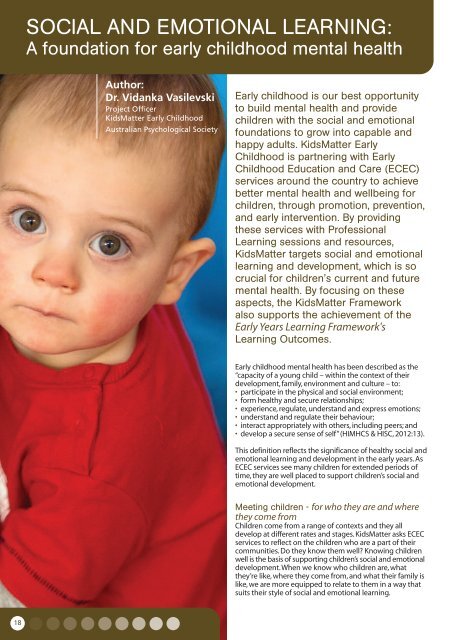
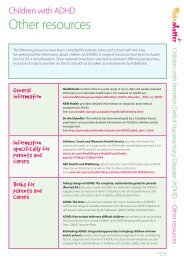
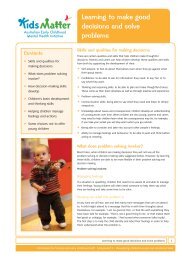
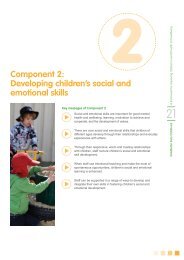
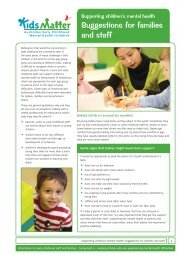
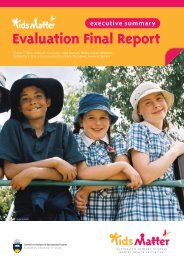
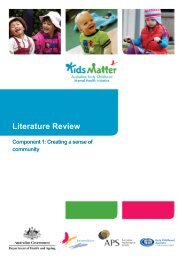
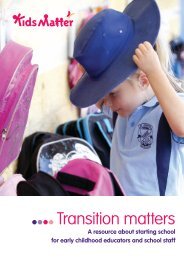
![Trinity Anglican School - Cairns story [378KB]pdf - KidsMatter](https://img.yumpu.com/41716076/1/184x260/trinity-anglican-school-cairns-story-378kbpdf-kidsmatter.jpg?quality=85)
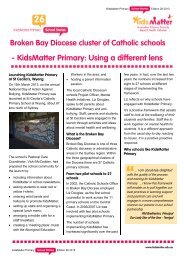
![Happy families work together [327KB] PDF - KidsMatter](https://img.yumpu.com/40767384/1/184x260/happy-families-work-together-327kb-pdf-kidsmatter.jpg?quality=85)
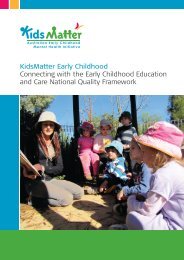
![Action Team Handbook 2012 [1.9M] [PDF] - KidsMatter](https://img.yumpu.com/38050920/1/184x260/action-team-handbook-2012-19m-pdf-kidsmatter.jpg?quality=85)
![[1008KB]pdf - KidsMatter](https://img.yumpu.com/38050895/1/184x260/1008kbpdf-kidsmatter.jpg?quality=85)
